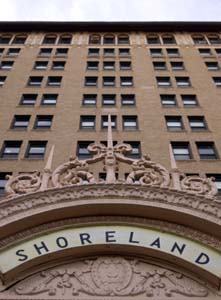 |
|
|||||||||
|
End of an era? After announcing in mid-October that the Shoreland faces an uncertain future, the University began a series of discussions on the residence hall’s role in the undergraduate housing system. Suddenly the building became a cause, complete with “Save the Shoreland” T-shirts, campaigning, and hand-wringing.
Yet only 20 Shoreland supporters—mostly current residents—showed up for a November 13 forum at the Reynolds Club, leaving rows of neatly arranged chairs empty. Largely to blame for the low turnout was a sense of defeat among the pro-Shore ranks. “Most Shoreland residents feel the issue already has been decided,” said second-year Quinn Cary, a coordinator of Save the Shoreland, a grass-roots student organization with its own Web site (www.savetheshoreland.com). Current and former Shoreland residents—about 3,350 people in all—had learned from e-mails and letters signed by Cheryl Gutman, deputy dean of students for housing and dining services and assistant dean of the College, and Stephen Klass, vice president and dean of students, that the 650-bed hall needs nearly $50 million in repairs—more than a third for city-mandated facade work. Other necessary fixes include rehabbing the ventilation and air-handling systems and replacing the boilers, windows, and internal plumbing. “This is real money in anybody’s book,” Klass told the Reynolds Club audience. “We’ve been investing disproportionately in the Shoreland.” For about the same amount, administrators estimate, they could build a new dormitory closer to campus. For pro-Shore students the debate transcends budget constraints. Regardless of the cost, the Shoreland is worth preserving, they argue, for the unique living experience it affords. Few U.S. campuses have residence halls like it. Constructed as a hotel in 1926, the Shoreland earned a reputation for catering to the well-to-do. According to local lore, celebrity guests including Al Capone and Elvis Presley stayed there. In 1976 the University acquired the building, which had gone into foreclosure, without a specific function in mind. Soon thereafter a bed shortage sealed its destiny as a dorm and, even before renovations, students were assigned to the hall. Every fall about 220 first-years move into the Shoreland, often reluctantly because of its location at the northwestern corner of 55th Street and South Shore Drive, a 15-minute walk from campus. But its proximity to restaurants and nightlife—not to mention its lake views and spacious suites—soon wins converts. Recognizing those perks, Gutman, Klass, and other administrators wish saving the Shoreland were financially feasible. “If we could do it, we would love to,” said Katie Callow-Wright, director of undergraduate student housing and associate dean of students. “If we had the money.” To meet increasing demand on the housing system (by fall 2005 the University may require 100 more beds than the 2,621 it currently has), officials want to break ground as soon as possible on a new residence hall, with at least 250 beds, likely south of Burton-Judson Courts. Building a larger complex would offset the loss of the Shoreland’s 650 beds—an option under consideration. Money isn’t the only issue. A movement is also under way, at Chicago and other universities nationwide, to centralize students around the heart of campus, creating a tighter college community. Following that trend—one, Gutman said, that many Chicago undergrads favor—would support decommissioning the dorm. Included on the National Registry of Historic Places, the Shoreland has strict limitations on its use. The University has hired a real-estate consultant to determine the level of commercial interest in the building as an apartment or condominium complex. Although Klass insisted, “We have not made up our minds,” he and Gutman conceded that they had yet to hear a viable alternative to selling the hall. The University plans to render a verdict in January. The lack of choices upsets pro-Shore students, particularly those less fond of Max Palevsky Residential Commons, the University’s latest dorms, whose modern design stands in stark contrast to the stately Shoreland. “I think the Shoreland is better than what you would” offer in its place, one student told administrators at the meeting. But even while losing faith, the Shoreland’s staunchest supporters continued their fight. Save the Shoreland’s Web site links to a petition and a survey. For $10 visitors can buy T-shirts displaying an image of the building—and “all profit,” the site says, “goes to creating more propaganda.” For his part, Klass appreciates the group’s efforts. “Even when we do not or cannot implement what students are requesting,” he said, “the quality of these interactions is uniformly high, and we always come away with a stronger understanding of the universe of issues that inform these typically complex situations.” Save the Shoreland, Gutman added, has “been very helpful in giving us a current and fresh understanding about what is important to students who live” there. She understands why they love the building—after coming to the University in 1992, she lived there herself for nine years.—M.L.
|
|
Contact
|


